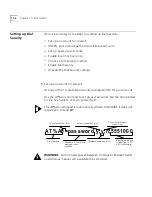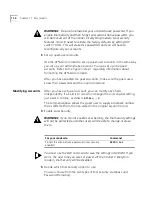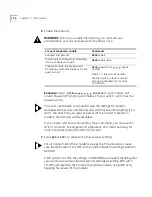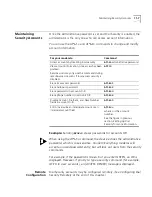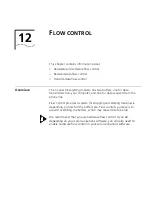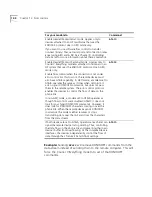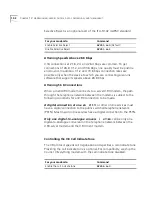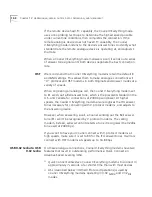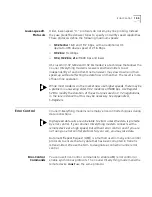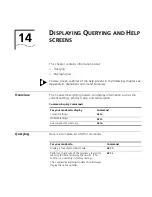
12-4
C
HAPTER
12: F
LOW
CONTROL
Example:
Sending
AT&I2
will remove XON/XOFF commands from the
data stream instead of sending them to the remote computer. This will
force the Courier V.Everything modem to act of the XON/XOFF
commands.
Enable Hewlett Packard-Host mode. Applies only to
devices attached to an HP mainframe that uses the
ENQ/ACK protocol. Use in ARQ mode only.
If you want to use software flow control to transfer
non-text (binary) files, set serial port and connection rates
equal using &B0 and & N0. See Chapter 9,
Controlling
Data Rates
for more information about these commands.
AT&I3
Enable Hewlett Packard-Terminal mode. Applies only to
Courier V.Everything modems attached to terminals in an
HP system that uses the ENQ/ACK protocol. Use in ARQ
mode only.
Enable flow control when the connection is not under
error control. For this to work, the remote device must
also have AT&I5 capability. In ARQ mode, a modem set to
AT&I5 operates the same as it does when set to &I2. It
acts on your XON/XOFF commands, but does not pass
them to the remote system. The error-control protocol
enables the devices to control the flow of data on the
phone link.
In non-ARQ mode, a modem set to AT&I5 operates as
though flow control were disabled (AT&I0); it does not
look for your typed XON/XOFF commands. However, it
does look for XON/XOFF characters coming in over the
phone link. When the remote device sends XON/XOFF
commands, the modem either resumes or stops
transmitting data over the link and drops the characters
from the data stream.
AT&I4
If both devices are set to AT&I5, operators at each end can
signal the remote device to stop sending. Thus, controlling
the data flow on the phone link and preventing their own
device’s buffer from overflowing. At the computer/device
interfaces, the devices independently control the flow of
data through their Transmit Data (AT&H) settings.
AT&I5
For your modem to
Command
Summary of Contents for Courier
Page 12: ......
Page 28: ...1 14 CHAPTER 1 CONNECTING TO YOUR ISP ...
Page 36: ...3 4 CHAPTER 3 UPGRADING YOUR MODEM ...
Page 58: ...6 6 CHAPTER 6 WORKING WITH MEMORY ...
Page 64: ...8 4 CHAPTER 8 CONTROLLING EIA 232 SIGNALING ...
Page 72: ...9 8 CHAPTER 9 ACCESSING AND CONFIGURING THE COURIER V EVERYTHING MODEM REMOTELY ...
Page 80: ...10 8 CHAPTER 10 CONTROLLING DATA RATES ...
Page 96: ...12 6 CHAPTER 12 FLOW CONTROL ...
Page 108: ...13 12 CHAPTER 13 HANDSHAKING ERROR CONTROL DATA COMPRESSION AND THROUGHPUT ...
Page 112: ...14 4 CHAPTER 14 DISPLAYING QUERYING AND HELP SCREENS ...
Page 122: ...15 10 CHAPTER 15 TESTING THE CONNECTION ...
Page 142: ...17 8 CHAPTER 17 TROUBLESHOOTING ...
Page 156: ...A 14 APPENDIX A S REGISTERS ...
Page 172: ...B 16 APPENDIX B ALPHABETIC COMMAND SUMMARY ...
Page 178: ...C 6 APPENDIX C FLOW CONTROL TEMPLATE ...
Page 186: ...E 4 APPENDIX E V 25 BIS REFERENCE ...



